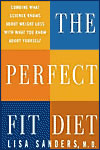Battle of the Weight Loss Books

PAGE 7
The Perfect Fit Diet
By Lisa Sanders, MD
Working on the premise that no one diet fits all, Sanders, an internist, takes readers through an extensive questionnaire to determine whether counting carbs, fats, or calories will work best for them. Then she helps readers customize their weight loss plan to incorporate personal taste, behavior patterns, and medical history.
What the experts like: Both Perry-Bottinger and Lash found this to be the best of the bunch. "The reason I like it is the reason I think it's the lowest of these books on the Amazon sales list," says Lash: "It doesn't have any gimmicks." Economos is wary of the Counting Carbs option, but gives Sanders points for asking her readers to keep a food and exercise diary during the week before they start. "It puts responsibility on the individual," she says. "When I have people do that for me, it changes the way they eat."
What they don't like: Lash suspects most people would prefer more rules. And the experts generally agree that the calorie count for each of the three diets is a bit low, making maintenance difficult, especially for people who are exercising.
Crunching the numbers: Depending on the method, daily calories total 1,200 to about 1,350. The Counting Fats plan has plenty of fiber and emphasizes the "good" fats, although it doesn't include enough zinc or vitamins B12 and E. Counting Calories also has fiber but is deficient in vitamins D and E, and iron. Counting Carbs is the least healthy: low in fiber, thiamin, vitamins D and E, iron, magnesium, and zinc, and high in fat, which provides more than 200 percent of the RDA of cholesterol.
By Lisa Sanders, MD
Working on the premise that no one diet fits all, Sanders, an internist, takes readers through an extensive questionnaire to determine whether counting carbs, fats, or calories will work best for them. Then she helps readers customize their weight loss plan to incorporate personal taste, behavior patterns, and medical history.
What the experts like: Both Perry-Bottinger and Lash found this to be the best of the bunch. "The reason I like it is the reason I think it's the lowest of these books on the Amazon sales list," says Lash: "It doesn't have any gimmicks." Economos is wary of the Counting Carbs option, but gives Sanders points for asking her readers to keep a food and exercise diary during the week before they start. "It puts responsibility on the individual," she says. "When I have people do that for me, it changes the way they eat."
What they don't like: Lash suspects most people would prefer more rules. And the experts generally agree that the calorie count for each of the three diets is a bit low, making maintenance difficult, especially for people who are exercising.
Crunching the numbers: Depending on the method, daily calories total 1,200 to about 1,350. The Counting Fats plan has plenty of fiber and emphasizes the "good" fats, although it doesn't include enough zinc or vitamins B12 and E. Counting Calories also has fiber but is deficient in vitamins D and E, and iron. Counting Carbs is the least healthy: low in fiber, thiamin, vitamins D and E, iron, magnesium, and zinc, and high in fat, which provides more than 200 percent of the RDA of cholesterol.



